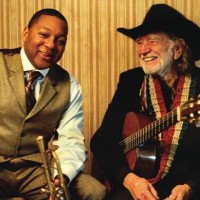Delfeayo Marsalis is a trombonist, composer, author and educator. He founded the Uptown Music Theatre in New Orleans and has released several albums including Make America Great Again (2016) The Last Southern Gentlemen (2014) Sweet Thunder (2011) and Minions Dominion (2006) all on Troubadour Jass Records. He was named an National Endowment for the Arts Jazz Master in 2011 and has produced more than 120 jazz albums and released seven albums as a leader. He has also composed 18 children’s musicals, and is the author of the award-winning children’s book No Cell Phone Day.
Now Delfeayo has released his first live album, Kalamazoo (Troubadour Jass Records), with his father Ellis Marsalis Jr. on piano, Reginald Veal (an ex-student of Ellis’s) on bass and the formidable drummer Ralph Peterson (OTB, James Brown, Earth Wind and Fire, Fo’tet). A concert in Michigan saw this quartet deliver a truly mesmeric performance – and thankfully the first-time performance of this quartet was captured here.
Of course, live recordings are without the control, tweaking and tinkering that a studio production affords, but the upside is you get a sense of the atmosphere, the rapport of the musicians with each other and the audience and importantly, the bare bones of their performance is revealed. In Kalamazoo, you can hear and feel the chemistry which exists between the musicians and their audience. Delfeayo Marsalis proves himself both an alchemist and entertainer. It is clear that audience and musicians alike share the atmosphere and the sense of communication and one-ness.
[SOMETHING ELSE! INTERVIEW: Producer and trombonist Delfeayo Marsalis talks about working with his famous brothers, even while establishing his own musical philosophy away from them.]
This recording was made on the final night of a seven-day tour to support Delfeayo’s album The Last Southern Gentlemen. Other than his father Ellis, the rhythm section is new and the quartet hadn’t played together on stage before. So, there are some lovely, spontaneous and unrehearsed interactions which make the Kalamazoo even more special. “Live recordings are important because they truly capture the essence of who you are as a person and how you play as a musician,” Defleayo has said. “Different artists create their definitive live recordings at different points in their career. For example, my brother Branford was 31 when he recorded Bloomington. Wynton was 42 when he was finally captured on Live at the House of Tribes. This is my equivalent to those recordings; it gives the listener a true understanding of who I am, how my shows are structured.”
Delfeayo’s music is broad and his recordings in the past have included big-band protest (Make America Great Again) to more explorative and modern jazz (Pontius Pilate’s Decision“) to the re-thinking of Ellington’s Shakespearean tribute (Sweet Thunder) so Kalamazoo is not an attempt to encapsulate his music but rather it reveals perhaps more of Delfeayo’s personality as he takes the listener through a range of feelings and emotions – from grinding blues to swing and different historical jazz references.
Kalamazoo opens with much clapping and whoops (well, this is a live recording), before “Tin Roof Blues” eases in with many different trombone techniques – all of them delivered with ease and the audience is clearly captivated. A beautifully worked piano solo from Ellis Marsalis is delivered with laid back aplomb, belying the trickiness of the arrangement. The bass and drums are solid underneath, as the drums offer rhythmic changes and interest – but then, this is the mighty Ralph Peterson. “Tin Roof Blues” seems to end but wait: As the audience begins go slightly nuts, the bass is still solo-ing, introducing some pretty quirky takes on the lines of the song. Then the trombone slides in over the top and re-creates the blues-y, slightly rolling feel of this number. They finish with a trill.
“Autumn Leaves” is beautifully delivered with the essence of the original unsullied, yet there is energy and some twists here. Marsalis’ trombone playing is just beautiful and the track is done justice by both him and the other musicians, as the middle section improvises around the theme without ever losing it. A thoroughly brilliant piano interlude is punctuated perfectly by the percussion from Ralph Peterson and another bass solo loops up and around the theme, counterpointed by the drums to lead into a short but very sweet drum solo before the trombone once again (eventually) reminds us that this is “Autumn Leaves.” The communication is tangible.
“My Funny Valentine” is beautiful. The trombone is perfectly suited to pull on the heart strings and in Delfeayo Marsalis’ hands it does – and then some. The trombone and piano work together really well here, and this is delivered with emotion and a respect which reflects the beauty of the song itself. The trombone solo rightly gets applause before the piano carries on with an equally beautiful interpretation, supported softly by the bass and drums. This is a lovely, easy-on-the-ears number.
Next, Marsalis introduces something we’ve all heard for years without realizing it was “actually a blues.” The number receives ripples of applause as the audience gradually realizes what they are hearing – albeit re-worked incredibly well. This is the “Theme from Sesame Street.” And Delfeayo is, of course, right: It is a blues, written by Jo Raposo though I am pretty sure when he wrote the music as a theme to the children’s program he never realized how it would be interpreted. For Kalamazoo, the theme is given the Delfeayo Marsalis treatment – mutes and all, to create a real wah-wah sound in one part. The mute lends a voice-like sound to the notes, which adds a soupcon of humor, reminding us this is a children’s show theme. Sweet – very.
“If I Were a Bell” features the piano of Ellis Marsalis, and is a lively, very swingy delivery of the Guys and Dolls number – with lots of twinkly additions and stalwart support from the rhythm section. It’s simply wonderful to hear, with a glorious bass solo under which the drums beat the heck out of the rhythm, whilst not detracting in any way. Like many bass players, Reginald Veal adds his voice to the bass line and can clearly be heard, which adds to this solo. Delfeayo Marsalis’ own composition “The Secret Love Affair” is slide-y, slightly sleazy and delicious, a borrowed number from Delfeayo’s previous album. The trombone is featured telling in this narrative of a love affair, “a secret,” Marsalis tells us. There is room for all in this arrangement and some great piano and bass conversations happen whilst the drums come to the fore and drop down when needed. A lovely number and worked well by the quartet.
“It Don’t Mean a Thing if It Ain’t Got That Swing” is, of course, known the world over as a standard, and this quartet deliver it with respect and almost the energy of Duke Ellington himself. It feels a little restricted in places, but the audience love it, as shown by the enthusiastic hand-clapping rhythms which accompany this from two minutes in. The drums are amazing in this number, the timing perfect and the choice of emphasis and skins verging on the exquisite. The trombone is perfectly placed, as well, and gives way to a great interlude for the drum solo, which is delivered with emphatic stress on the rhythm intrinsic to this number. The jungle sound redolent of Duke’s big band appears occasionally even – a really enjoyable and fun interpretation.
“Introducing the Blues” is a verbal explanation of what follows. Two University of Michigan students have showed up in the audience, at Delfeayo Marsalis’ invitation. He had apparently told them if they showed up, they could have a spotlight. So, he calls them up. One is vocalist Christian O’Neill Diaz, the other drummer Madison George. Delfeayo then asks Christian if he normally sings big-band style, to which the answer is “yes.” Marsalis tells him, “We don’t do that but can you scat?” It turns out he can – sort of, at least. Delfeayo then asks him which key he prefers, Diaz tells him F or B flat. Marsalis tells him they don’t want to play in those keys, and he ends up with a D flat. There follows Marsalis’ forte, which is making songs up on the spot and he has virtually tricked the audience and musicians into it. Ha!
Diaz and George, finding themselves the center of attention, do a fine job on the subsequent “Blue Kalamazoo,” considering it probably felt like walking on coals. Diaz has a good voice and adapted well to scat mostly, getting appreciative applause from the audience. “Part of maturing is being able to not only assist, but to also challenge the younger generation,” Delfeayo Marsalis says. “If we had performed a song that Christian sings all the time, he would have probably sung in auto-pilot mode. Creating a song together spontaneously forces you to reach deep inside and stay committed to the moment. It’s an African tradition.”
Kalamazoo finishes with “Do You Know What It Means to Miss New Orleans.” This is just lovely and shows each musician in the spotlight for a fleeting time, all too soon drawing to a close.
Throughout the recording there is a sense of cohesion, and it is hard to believe these musicians have not played as a quartet before. The standards were decided there and then. You can hear snippets of conversation both from voices and, of course, through their instruments. There is also due respect given to the spaces and pauses – which, sometimes, can add emphasis or interpretation to music. All of the musicians seem to intuitively understand where these should be. Together, they’ve created a very entertaining and insightful album.
- Milena Casado – ‘Reflection of Another Self’ (2025) - May 4, 2025
- Luis Ianes and Noel Akchote – ‘Seuil’ (2025) - April 12, 2025
- David Dower Trio – ‘Sonder’ (2025) - March 23, 2025



